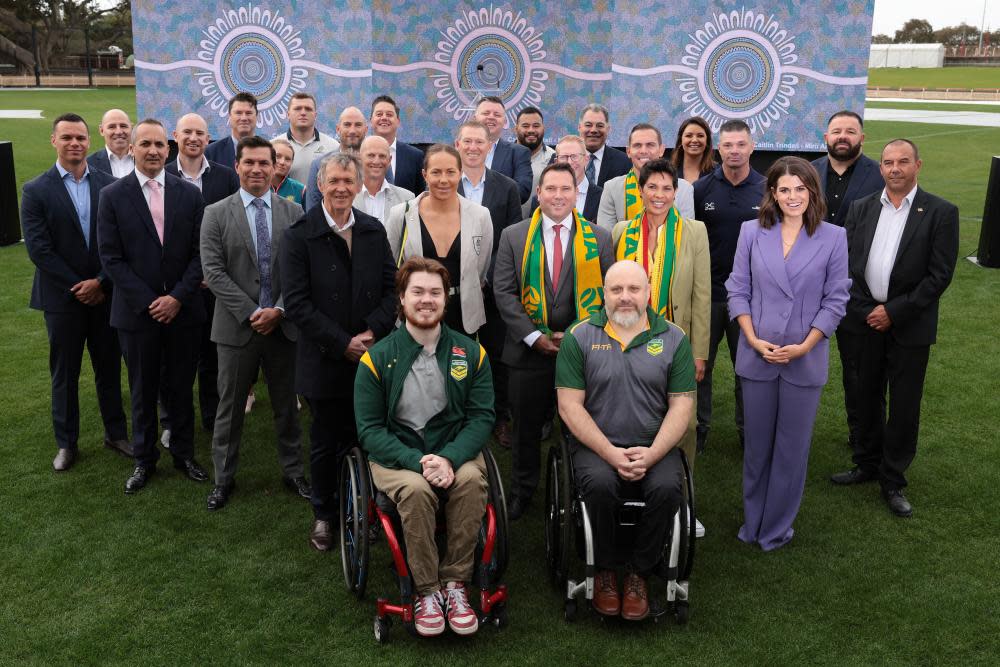More than 20 Australian sporting codes unite in support of Indigenous voice to parliament

More than 20 Australian sporting codes have united in support for an Aboriginal and Torres Strait Island voice to parliament.
Current and former players, executives and other industry leaders from the seven major sports, plus others including golf, basketball, boxing and baseball,, joined together in Melbourne and Sydney to collectively pledge their support for an Indigenous voice to be enshrined in the constitution.
Related: ‘Let’s get it over the line’: Rugby Australia and AFL back Indigenous voice to parliament
The AFL, NRL, Rugby Australia, Football Australia, Netball Australia, Tennis Australia and Cricket Australia have individually confirmed their support for the voice but on Wednesday came together to publish an open letter to all Australian sport fans, saying: “We, as a collective, support recognition through a voice.”
“[Sport] has long been a means for the inclusion and celebration of the incredible achievements of Aboriginal and Torres Strait Islander peoples,” the letter said.
“This year, all Australians will have their say in a referendum to recognise Aboriginal and Torres Strait Islander peoples in the constitution by establishing an Aboriginal and Torres Strait Islander voice.
“We commit to using our platforms to lead conversations that promote respect, trust and goodwill between Indigenous and non-Indigenous Australians. We commit to improving education and understanding among the Australians who play, administer and watch our sports.”
The chief executive of No Limit Boxing, Gamilaroi man George Rose, said he was proud to be among the sporting stars and bodies joined in support of the voice.
“This may be a small step but it’s a step that we want to be a part of,” Rose said. “Sport has always been an equaliser for our people, it’s always given us a chance to be the best that we can be.
Australian sporting identities Jamie Pittman, Jade North, Mal Meninga, Andrew Gaze, Cath Cox, Eddie Betts and Jason Gillespie read out the letter on Friday morning.
The general manager of inclusion and social policy at the AFL, Tanya Hosch, thanked the assembled “for coming together as sports to represent a shared vision for a reconciled Australia”.
“As sport codes we are responsible for connecting millions of Australians and together we hope we can raise awareness about the fact that we are going to have a referendum this year to recognise the first peoples of this country.”
The Yes alliance campaign director, Dean Parkin, said the announcement was “a profound statement of support on this vital national conversation from organisations with deep roots across every Australian community”.
“Sport creates a great sense of togetherness, be it among a group of neighbourhood friends or through a victory that brings the country together in celebration. Sport also is a great leveller – where we learn about fairness and working together.”
Athletics Australia remains an outlier, as it has not publicly committed to a position on the voice. In a statement Athletics Australia said it was “committed to the notion of equity in opportunity across the community whether this is based on ethnicity, gender, ability or social background”.
“We are currently consulting many of our stakeholder groups including our Athletes Advisory Committee, Reconciliation Action Plan Working Group and past and present Indigenous athletes before making a decision, or committing to voicing a position on the Indigenous voice to parliament.”
The organisation said it appreciated “all Australians, whether Indigenous or non-Indigenous are entitled to their own opinions on this”.
Speaking on ABC Radio National for the sixth anniversary for the Uluru statement from the heart, the minister for Indigenous Australians, Linda Burney, said there had been “enormous support from the AFL, the NRL, Cricket Australia, the ARU”.
Asked whether the public backing from big institutions such as sporting organisations and business groups ran the risk of coming across as elitist, Burney said to remember that the Uluru statement from the heart “came from grassroots people”.
“It came from over 1,200 Aboriginal people meeting across the country with the dialogues culminating in the constitutional conventions six years ago at Uluru, that’s where it came from, that’s what we must remember every day of this campaign.”

 Yahoo News
Yahoo News 
